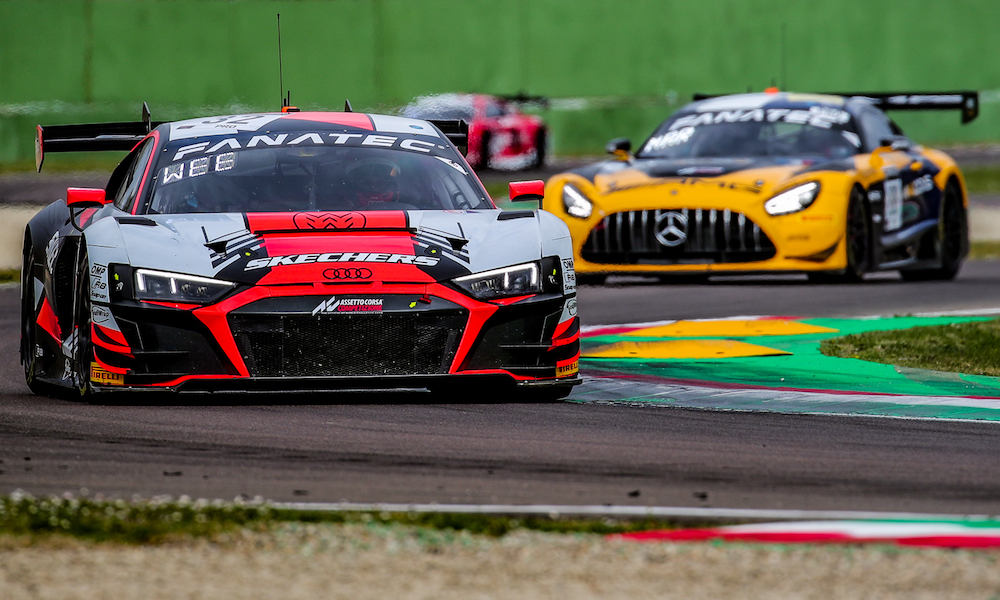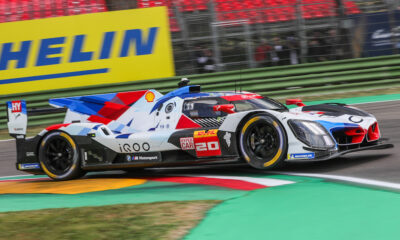
Photo: Jules Benichou/SRO
Audi Sport and Mercedes-AMG are monitoring the FIA World Endurance Championship’s GT3 Premium concept and both want to hear more about its technical details.
The WEC’s adoption of GT3 cars from the 2024 season, in place of the outgoing GTE formula, could enable the two major German manufacturers to be represented in the global championship and the 24 Hours of Le Mans through customer teams.
A core premise of the WEC’s future GT class is the removable GT3 Premium kit, which was announced last month and will be a requirement for teams racing in the series.
“I think, from the start, if you want to adopt a successful formula, we are excited,” Audi Sport’s head of customer racing Chris Reinke told Sportscar365.
“Now a different decision has been made. Before I would sanction a reaction to it, I think the next step has to be what exactly do they want?
“Understand why it had to happen, or could it be maybe beneficial? Give it a chance from all angles. And then try to answer questions about the decision or adjust the decision.
“At the moment, if I could have had the choice, I would have rather not had this decision. But now we will act professionally with it.”
Reinke queried whether GT3 Premium kits will be cost-effective and echoed some of the thoughts expressed by Porsche Motorsport Vice President Thomas Laudenbach, who last month personally questioned the need for a premium version of GT3.
On the other hand, SRO Motorsports Group CEO and GT3 architect Stephane Ratel does not feel that costs will be a barrier.
“We have a well-balanced and healthy GT3 scene worldwide,” said Reinke.
“It has received the privilege to be accepted in Le Mans. Why do this differentiation? For us, if we follow this route, it will always be with a [financial] deficit.
“Because if this Le Mans kit, as far as I’m informed, is to be priced at €50-100,000, you cannot develop an aero-balanced car of that level with six to eight kits to that price sold.
“So why enforce a deficit on a sustainable business just to differentiate on your behalf? I think we are not the only manufacturer to question why it is needed. I think this is where we stand at the moment.”
Mercedes-AMG is interested in supporting customer teams that want to race in the new WEC and Le Mans GT class, which will be open to Pro-Am driver lineups only and utilize commercial rather than confidential tires.
Its customer racing coordinator Thomas Jaeger also highlighted that the GT3 Premium kit’s impact on performance will need to be carefully anticipated and managed.
The FIA and ACO have stated that the kit is not designed to enhance performance, but questions remain over how design tweaks will affect the cars’ aerodynamic nature.
“Le Mans is very interesting for our customers, so we have a lot of demand for racing there,” Jaeger said.
“They wanted differentiation between standard GT3 and GT3 Premium. I, to be honest, expected that the guidelines or the rules would be published as soon as possible so we can prepare for this.
“The question is, therefore, how [to have] the different body kit without affecting performance? If you’re changing a body kit you will always affect performance.
“BoP is a very special thing, as we have seen at Le Mans in [recent] years.
“We have to take care that the costs are not too high and the cars really have a differentiation, that you can see the difference from 50 or 100 meters. That is difficult to reach with just a pure body kit.
“Just by these small changes, it will be interesting how the regulations look like. Of course, many clients are asking for it. We have the people looking into it and we will see how we react.
“But if customers want to go there, we will guide them and help them to be successful at Le Mans.”
Too Early for Both to Make Premium Commitment
Jaeger would not be drawn to say whether it would be feasible for Mercedes-AMG to make a GT3 Premium kit for the first season in 2024, potentially for just one year.
Mercedes-AMG’s Customer Racing director Stefan Wendl told Sportscar365 in May that the manufacturer is looking to introduce a new GT3 product in 2025.
“That depends a little bit on the customers, and it depends on our strategy of when we introduce a new car,” Jaeger said.
“There might be the option of having a new car in 2025, but the decision has not been finalized yet.
“That’s why we are waiting for the regulations, seeing what is really necessary and how expensive it might be.
“Then we will have a look at it and take a decision, but it will probably take a while because the regs are not out yet.”
Audi is in a similar position, with its Audi R8 LMS GT3 Evo II confirmed to run for three years meaning it will be active until the end of 2024 at present.
“We have not had that discussion yet,” Reinke stated.
“Also we need to get hold of a clear description of what is being asked for technically. How will the cost cap be recognized and what exactly is needed?
“I had the chance of a personal exchange with [ACO President] Pierre Fillon at Goodwood, on the behalf that to differentiate was the goal.
“But the real description of what it should and could be, what are the performance windows, all that needs to be clarified before we start to evaluate whether it makes commercial or strategic sense for us.”























